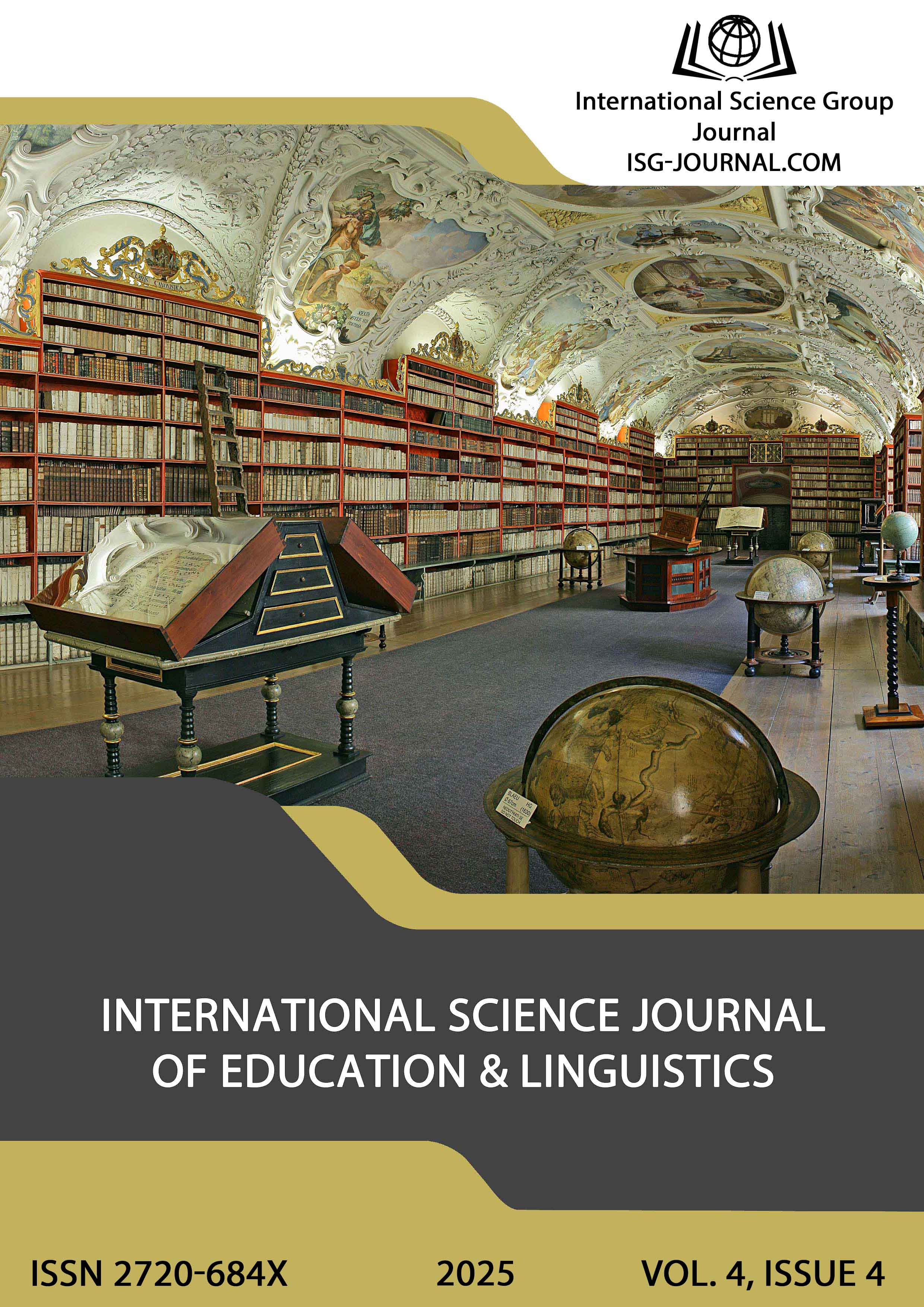Methods for Personalized Student Learning in Modern Educational Space
DOI:
https://doi.org/10.46299/j.isjel.20250404.01Keywords:
personalized learning, modern technologies, adaptive learning, microlearning, individualized learning plans, project-based activities, feedback, gamification, artificial intelligence, differentiated instruction, project-based and problem-based learningAbstract
This article delves into the concept of personalized learning within the context of contemporary higher education, focusing on its orientation towards individual needs. Thanks to modern technological advancements, including breakthroughs in big data, learning analytics, and the development of intelligent tutoring systems, the potential of personalized learning has significantly expanded. These technologies enable a deep and dynamic adaptation of the educational experience, taking into account each student's unique abilities, learning objectives, and individual preferences. This is a fundamental prerequisite for enhancing the effectiveness and transparency of the educational system. Our research provides a detailed analysis of leading conceptual approaches to personalized learning, specifically adaptive learning, differentiated instruction, project-based and problem-based learning, and competency-based education. We examine a range of specific methods and tools for implementing personalization, including individualized learning paths, differentiation of assignments, mentoring and tutoring, as well as the crucial role of adaptive learning platforms and artificial intelligence. Particular attention is paid to the challenges of implementing personalized learning in higher education institutions. The study identifies significant barriers such as limitations in technological infrastructure, insufficient readiness among faculty, ethical and legal aspects of using big data, systemic conservatism and resistance to change, as well as methodological and financial complexities. Despite these challenges, the substantial benefits of personalized learning are emphasized: it contributes to increased student motivation, improved academic results, the development of self-regulated learning skills, and more effective preparation for the demands of the modern labor market. It is demonstrated that personalized learning is not merely an innovative trend but an imperative, strategic necessity for the contemporary higher education system. Its purposeful and effective implementation will enable higher education institutions not only to align with global educational transformations but also to actively prepare highly qualified specialists who possess adaptability and the capacity for continuous self-development in a dynamic global labor market.References
Бойченко, Оксана. (2021). Перспективи використання інтелектуальних навчальних систем в закладах освіти. Actual Problems in the System of Education General Secondary Education Institution – Pre-University Training – Higher Education Institution. 74-76. 10.18372/2786-5487.1.15827.
Бондаренко, Л. Ю. (2022). Інтелектуальні системи навчання в освітньому процесі. Розвиток сучасної науки та освіти : реалії, проблеми якості, інновації. ТДАТУ. 429–433. http://elar.tsatu.edu.ua/handle/123456789/16770
Гороховський, О. (2010). Інтелектуальні системи. Навчальний посібник. Вінниця. ВНТУ. 194 с.
Лаптєва, М.В. (2015). Інтелектуальні навчальні системи в практиці підготовки іноземних студентів. Засоби навчальної та науково-дослідної роботи, (45), 35–45. https://doi.org/10.5281/zenodo.56255
Прудка, О.В. (2006). Адаптивні та інтелектуальні системи для дистанційного навчання. Актуальні проблеми економіки, (10), 184–189.
Фендьо, О. (2023). Сучасні онлайн-інструменти для організації інтерактивного навчання. Actual Problems in the System of Education: General Secondary Education Institution – Pre-University Training – Higher Education Institution, (3), 620–632. https://doi.org/10.18372/2786-5487.1.17749
Peter, S.E., Bacon, E., & Dastbaz, M. (2010). Adaptable, personalised e‐learning incorporating learning styles. Campus-Wide Information Systems, 27(2), 91–100. https://doi.org/10.1108/10650741011033062
Zhou, Y. (2025). Machine Learning-Based English Learning Behaviour Pattern Recognition and Personalised Teaching Strategies for College Students. Journal of Combinatorial Mathematics and Combinatorial Computing, 127a, 503–522. https://doi.org/10.61091/jcmcc127a-030
Adams, C. M., Cotabish, A., & Dailey, D. (2021). Differentiated Learning Experiences. У A Teacher's Guide to Using the Next Generation Science Standards with Gifted and Advanced Learners. 44–90. https://doi.org/10.4324/9781003238522-3
Oliveira, J., Panontim, L., Fonseca, V. H., Gonçalves, P., Napoleão, D., & Alcântara, M. (2021). Project-Based Learning. International Journal for Innovation Education and Research, 9(7), 224–237. https://doi.org/10.31686/ijier.vol9.iss7.3244
Permatasari, C. P., Yerizon, Y., Arnawa, I. M., & Musdi, E. (2020a). Improving Students’ Problem-Solving Ability through Learning Tools Based on Problem Based Learning. Journal of Physics: Conference Series, 1554, 012017. https://doi.org/10.1088/1742-6596/1554/1/012017
Oroszi, T. (2020). Competency-Based Education. Creative Education, 11(11), 2467–2476. https://doi.org/10.4236/ce.2020.1111181
Саган, О. В. (2025). Організація персоналізованого навчання за допомогою штучного інтелекту. Collection of Research Papers Pedagogical sciences, (108), 37–43. https://doi.org/10.32999/ksu2413-1865/2024-108-6
Гнатик, К., & Фодор, К. (2023). Особливості застосування сучасних підходів у вивченні іноземних мов. Інноваційна педагогіка, (59), 113–116. https://doi.org/10.32782/2663- 6085/2023/59.23
Dutta, S., Ranjan, S., Mishra, S., Sharma, V., Hewage, P., & Iwendi, C. (2024). Enhancing educational adaptability: A review and analysis of AI-driven adaptive learning platforms. 2024 4th International Conference on Innovative Practices in Technology and Management (ICIPTM), 1–5. IEEE. https://doi.org/10.1109/ICIPTM59628.2024.10563448
Дзень, В., Борзов, Ю., & Дзень, Д. (2024). Інтеграція smart-систем в освітнє середовище закладів вищої освіти. Вісник ЛДУБЖД, 30, 56–66. https://doi.org/10.32447/20784643.30.2024.06
Ouyang, F., & Zhang, L. (2024). AI-driven learning analytics applications and tools in computer-supported collaborative learning: A systematic review. Educational Research Review, 44, 100616. https://doi.org/10.1016/j.edurev.2024.100616
Дроздов, Д. А., & Калайда, Н. С. (2025). Машинне навчання та штучний інтелект: можливості та виклики. Радіоелектроніка та молодь у XXI столітті: матеріали 29-го Міжнародного молодіжного форуму, 16–19 квітня 2025 р. (Т. 6, с. 410–412). Харківський національний університет радіоелектроніки. https://openarchive.nure.ua/handle/document/30890
Downloads
Published
How to Cite
Issue
Section
License
Copyright (c) 2025 Iryna Zhukevych, Natalia Biriukova

This work is licensed under a Creative Commons Attribution 4.0 International License.





